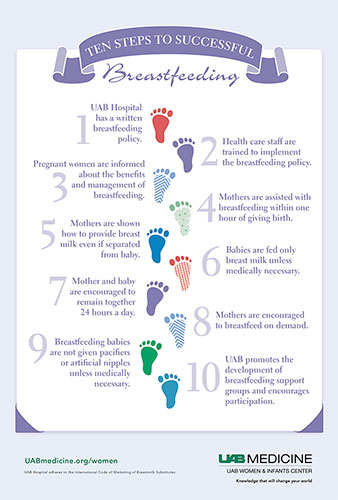
Share On Social!
University of Alabama at Birmingham (UAB) Hospital was designated a Baby Friendly Hospital in November, 2015 through Baby-Friendly USA‘s Baby-Friendly Hospital Initiative.
Baby-Friendly Designation is based on evidence-based findings that breastfeeding is beneficial for babies and mothers and recognizes hospitals and birthing centers that successfully implement the Ten Steps to Successful Breastfeeding to support breastfeeding mothers and provide them the information and resources necessary to breastfeed.
UAB Hospital staff and administrators began pursuing a Baby Friendly certification in 2011 by creating consistent messaging to promote breastfeeding, through focus groups with pregnant women and new moms, and by reaching out to specialists, such as obstetricians and pediatricians, and most importantly, by implementing the Ten Steps to Successful Breastfeeding. This is particularly important in Alabama because UAB is the largest teaching hospital in the region.
Alabama (4.1% Latino) and the Southwest region of the US have low rates of breastfeeding compared to the rest of the nation. They also have higher rates of childhood obesity, infant mortality, and diabetes. Latinos have low breastfeeding initiation rates, low breastfeeding exclusively rates, and low breastfeeding at one-year rates. A 2013 report named several reasons for the discrepancy, including unsupportive cultural norms, the misconception that formula feeding is better for baby, lack of partner support, and the absence of maternity leave or other work conditions that make breastfeeding possible, according to one source.
It is important to provide information, resources, and support for new Latino mothers-especially in a hospital setting during the first days of motherhood-to help kids start kindergarten at a healthy weight and reduce childhood obesity.
Learn more about UAB Hospital’s Baby Friendly designation here.
Share on Twitter: UAB Hospital nationally recognized as @BabyFriendlyUSA for supporting #breastfeeding. http://goo.gl/00y7Fm #SaludAmerica @UABNews
By The Numbers
142
Percent
Expected rise in Latino cancer cases in coming years



